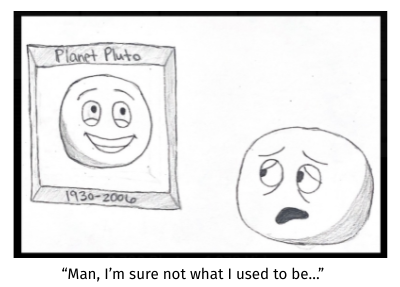The whole Pluto-not-being-a-planet thing has been a cosmic buzzkill since 2006. So, I’m about to talk about why we should ditch the “dwarf planet” label and give Pluto the recognition it deserves as our ninth planet.
Do you remember the moment when Pluto was stripped of its planetary status? This decision was made in 2006 by the International Astronomical Union (IAU), which redefined the criteria for what constitutes a planet. Pluto failed to meet the new criteria because it has not cleared its orbit of other debris in the Kuiper Belt, a region beyond Neptune that contains many icy objects.
However, many scientists and laypeople alike believe that Pluto still deserves its place in the lineup of planets. They argue that the IAU’s definition of a planet is too narrow and that Pluto should be considered a planet based on historical and scientific reasons. For example, Pluto was discovered in 1930 and has been considered a planet for nearly 76 years. Additionally, Pluto is the largest dwarf planet, especially when compared to Eris Pluto is larger than several other objects in the solar system that are classified as planets, such as Mercury, and has a unique geological makeup that scientists are still studying. In all honesty, no one cares but I want to talk about it because I miss Pluto.
Despite its small size and irregular orbit, Pluto has always been a fascinating object of study for astronomers. However, it wasn’t until recently that we discovered that size is not the only thing that makes Pluto special. Thanks to new scientific discoveries, we now know that Pluto has five moons, each with its own unique characteristics. In addition, Pluto’s atmosphere is unlike any other in our solar system, with a hazy blue appearance caused by the presence of nitrogen and methane gasses.
Furthermore, advancements in technology have allowed us to get a closer look at Pluto than ever before. In 2015, NASA’s New Horizons spacecraft flew within 7,800 miles of Pluto, providing us with unprecedented images and data about this distant world. This revealed intricate details about Pluto’s surface features, including vast plains, towering mountains, and even a heart-shaped basin. Pluto may be small and far away, but it is still a fascinating object of study, with many unique features waiting to be discovered. I mean seriously, a heart!
It is essential to recognize the gravity (get it) of the history associated with Pluto. In 1930, Clyde Tombaugh made a significant breakthrough in astronomy by identifying Pluto as the ninth planet in our solar system. This discovery was an important milestone in the field of astronomy, making Pluto the first-known “underdog” planet, discovered after an extensive search for a ninth planet in our solar system.
After its discovery, Pluto remained a topic of interest and study for astronomers worldwide. In 2006, the International Astronomical Union (IAU) reclassified Pluto as a “dwarf planet,” causing a significant controversy among the scientific community and the public. The decision to change its status was met with mixed emotions, with some applauding the move, while others protested it.
Many believed that the reclassification of Pluto as a “dwarf planet” was a disservice to the rich history and significance it holds. The decision to alter its status felt like erasing an integral part of our cosmic history. Despite the reclassification, many like me believe Pluto is still a planet.
For many years, Pluto had been classified as the ninth planet in our solar system. It was included in textbooks, documentaries, and was even featured in pop culture. It became a crucial part of our cosmic story, and we felt a certain attachment to it. Its removal from the list of planets was a significant change in the way we understand our solar system.
It felt like we were losing an old friend, a part of our childhood. The idea of Pluto being the ninth planet was so ingrained in our minds that it became a part of our space-loving hearts. Even though we know that the decision to reclassify Pluto was based on scientific reasons, it doesn’t make it easier to accept. We can’t deny that Pluto has played an essential role in our understanding of space, and we will always remember it as the ninth planet.
Pluto has long been a source of fascination for scientists and space enthusiasts alike. Despite being downgraded from planet status in 2006, Pluto’s scientific significance cannot be denied. It has a unique orbit that takes it far beyond the rest of the planets, and its surface is covered in methane, nitrogen, and carbon dioxide ices. Additionally, Pluto’s history is just as intriguing as its scientific properties. It was named after the Roman god of the underworld and has mythological significance in various cultures.
Reinstating Pluto as the ninth planet is more than just a matter of classification. It’s about acknowledging the importance of our curiosity and fascination with the cosmos. It’s about recognizing the role that Pluto has played in our understanding of the universe and our place in it. And it’s about keeping alive the sense of wonder and excitement that comes with exploring the unknown. It’s about having nine pizzas (mvemjsunp).
So why not welcome Pluto back into the planetary fold? Let’s celebrate its unique properties and contributions to science and culture. Let’s say, “Welcome back, Pluto – you’re officially part of the gang again!”
You heard about Pluto?
February 14, 2024
Categories:

Story continues below advertisement
7
More to Discover









